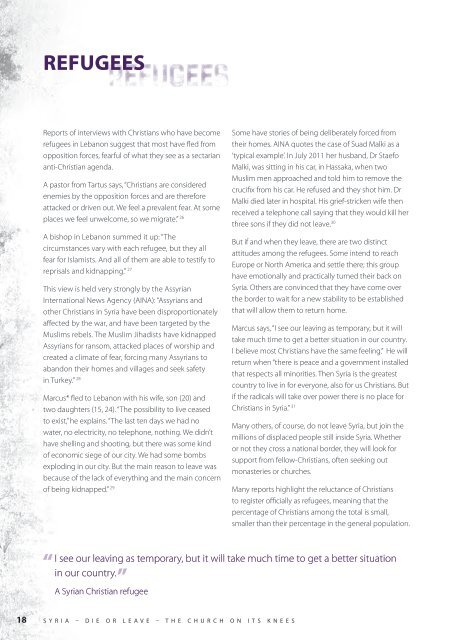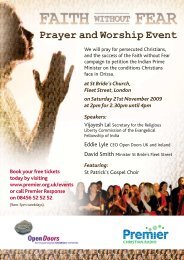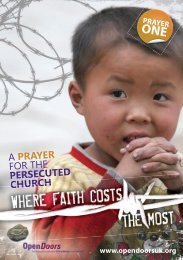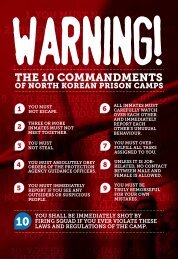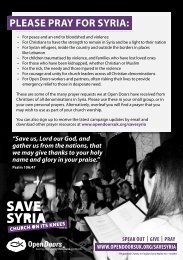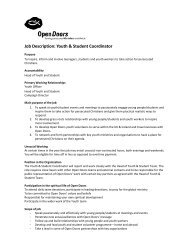Syria - Open Doors
Syria - Open Doors
Syria - Open Doors
Create successful ePaper yourself
Turn your PDF publications into a flip-book with our unique Google optimized e-Paper software.
REFUGEESRefugeesReports of interviews with Christians who have becomerefugees in Lebanon suggest that most have fled fromopposition forces, fearful of what they see as a sectariananti-Christian agenda.A pastor from Tartus says, “Christians are consideredenemies by the opposition forces and are thereforeattacked or driven out. We feel a prevalent fear. At someplaces we feel unwelcome, so we migrate.” 26A bishop in Lebanon summed it up: “Thecircumstances vary with each refugee, but they allfear for Islamists. And all of them are able to testify toreprisals and kidnapping.” 27This view is held very strongly by the AssyrianInternational News Agency (AINA): “Assyrians andother Christians in <strong>Syria</strong> have been disproportionatelyaffected by the war, and have been targeted by theMuslims rebels. The Muslim Jihadists have kidnappedAssyrians for ransom, attacked places of worship andcreated a climate of fear, forcing many Assyrians toabandon their homes and villages and seek safetyin Turkey.” 28Marcus* fled to Lebanon with his wife, son (20) andtwo daughters (15, 24). “The possibility to live ceasedto exist,” he explains. “The last ten days we had nowater, no electricity, no telephone, nothing. We didn’thave shelling and shooting, but there was some kindof economic siege of our city. We had some bombsexploding in our city. But the main reason to leave wasbecause of the lack of everything and the main concernof being kidnapped.” 29Some have stories of being deliberately forced fromtheir homes. AINA quotes the case of Suad Malki as a‘typical example’. In July 2011 her husband, Dr StaefoMalki, was sitting in his car, in Hassaka, when twoMuslim men approached and told him to remove thecrucifix from his car. He refused and they shot him. DrMalki died later in hospital. His grief-stricken wife thenreceived a telephone call saying that they would kill herthree sons if they did not leave. 30But if and when they leave, there are two distinctattitudes among the refugees. Some intend to reachEurope or North America and settle there; this grouphave emotionally and practically turned their back on<strong>Syria</strong>. Others are convinced that they have come overthe border to wait for a new stability to be establishedthat will allow them to return home.Marcus says, “I see our leaving as temporary, but it willtake much time to get a better situation in our country.I believe most Christians have the same feeling.” He willreturn when “there is peace and a government installedthat respects all minorities. Then <strong>Syria</strong> is the greatestcountry to live in for everyone, also for us Christians. Butif the radicals will take over power there is no place forChristians in <strong>Syria</strong>.” 31Many others, of course, do not leave <strong>Syria</strong>, but join themillions of displaced people still inside <strong>Syria</strong>. Whetheror not they cross a national border, they will look forsupport from fellow-Christians, often seeking outmonasteries or churches.Many reports highlight the reluctance of Christiansto register officially as refugees, meaning that thepercentage of Christians among the total is small,smaller than their percentage in the general population.I see our leaving as temporary, but it will take much time to get a better situationin our country.A <strong>Syria</strong>n Christian refugee18S Y R I A – D I E O R L E A V E – T H E C H U R C H O N I T S K N E E S


